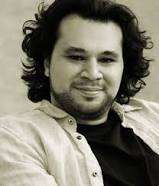Tamim al-Barghouti
Tamim Al-Barghouti (Arabic: تميم البرغوثي) is a Palestinian-Egyptian poet, columnist and political scientist.[1] He is nicknamed the "poet of Jerusalem" (شاعر القدس).[2]
Tamim al-Barghouti | |
|---|---|
 | |
| Native name | تميم البرغوثي |
| Born | Cairo, Egypt |
| Nationality | Palestinian, Egyptian |
| Website | |
| tamimbarghouti | |
Life
Tamim al-Barghouti was born in Cairo in 1977.[2] He is the son of Palestinian writer and poet Mourid al-Barghouti and the Egyptian writer, Radwa Ashour.[2] Around the time of Tamim's birth, Egypt was in peace talks with Israel that led to the Camp David Accords in 1979.[2] President Anwar Sadat then banished most prominent Palestinian figures from Egypt, including Tamim's father, Mourid al-Barghouti, when Tamim was five years old.[2][3] He would go with his mother to visit his exiled father living in Budapest on vacations.[3] Tamim cited his separation from his father as formational of his interest in political science.[2]
Tamim al-Barghouthi wrote his first poem, "Allah Yahdiha Falastīn" (الله يهديها فلسطين) in colloquial Palestinian Arabic when he was 18 years old.[2] He published his first diwan, or book of poetry, entitled Mijna (ميجنا)—also in colloquial Palestinian Arabic—in 1999 when he was 22.[2] His second poetry collection, entitled el-Munzir (المُنْظِر), was published the following year in Egyptian colloquial Arabic.[2]
In 1999, Tamim al-Barghouthi earned a bachelor's degree in political science from the College of Economics and Political Science at Cairo University.[2] He then earned a masters degree in politics and international relations from The American University in Cairo.[4]
On the eve of the American invasion of Iraq in 2003, he left Egypt in protest of its position on the invasion.[2] Between 2003 and 2004 he worked as a columnist at The Daily Star in Lebanon, writing on Arab culture, history, and identity.[5] He has then worked for the United Nations at the Division for Palestinian Rights, the Department of Political and Peacebuilding Affairs, and in 2005 and 2006 at the UN Mission in Sudan.[5]
He earned a Ph.D. in political science from Boston University in 2004.[6][2]
He wrote two poems that garnered him popular and critical acclaim: the first was "'Aluli: Bathab Masr?" (قالولي: بتحب مصر؟ "They Asked Me: Do you love Egypt?")[7] written in Egyptian colloquial Arabic, and the second was "Maqām 'Iraq" (مَقامُ عِراق "Maqam of Iraq") in Standard Arabic in 2005.[2][8][5]
He taught political science as an assistant professor at the American University in Cairo.[5] In 2007, he became a fellow at the Berlin Institute for Advanced Study.[5] He also worked as a visiting professor at Free University of Berlin and Georgetown University in Washington DC.[5]
In 2007, he wrote the critically acclaimed poem "Fi l-Qudsi" (في القدس "In Jerusalem") for the Emirate television competition show Amir ash-Shu'arā' (أمير الشعراء Prince of the Poets).[8] “In Jerusalem and Other Poems" was his first book translated into English.[3]
Selected works
Academic works
- The Umma and Dawla: The Nation-State and the Arab Middle East. London: Pluto Press. 2008.
- "الوطنية الأليفة" [Benign Nationalism]. Political Science-Middle East History (in Arabic). Cairo: The Centre of Contemporary Egyptian History of the Egyptian National Library. 2007.
- Davis, Rochelle; Kirk, Mimi, eds. (2013). "War, Peace, Civil War: a Pattern?". Palestine and the Palestinians in the 21st century. Bloomington: Indiana University Press.
- Shahin, Emad El-Din, ed. (2014). "The Post-Colonial State: The Impossible Compromise". The Oxford Encyclopedia of Islam and Politics. Oxford University Press.
- Shehadeh, Raja; Johnson, Penny, eds. (2015). "Cracking Cauldrons". Shifting Sands: the Unraveling of the Old Order in the Middle East. London: Profile Books.
Poetry collections
- Ya Masr Hanet. Dar Al-Shorouk. 2011.
- Fi Al-Quds. Cairo: Dar Al-Shorouk. 2008.
- Maqam Iraq. Cairo: Dar Atlas. 2005.
- Qalu li Bethebb Masr. Cairo: Dar el-Shourouk. 2002.
- Al-Manzhar. Cairo: Dar el-Shourouk. 2002.
- Mijana. Ramallah: Palestinian House of Poetry. 1999.
References
- Jenkins, Kate Shannon (September 22, 2017). ""Sometimes People Write Poetry with Their Feet": A Conversation with Tamim Al-Barghouti". The New Yorker. Retrieved 6 May 2018.
- الشرتح, عصام. تميم البرغوثي (تجليات المتخيل الجمالي) (in Arabic). ktab INC.
- Jenkins, Kate Shannon. ""Sometimes People Write Poetry with Their Feet": A Conversation with Tamim Al-Barghouti". The New Yorker. Retrieved 2020-06-13.
- "Tamim al- Barghouti (poet) - Palestine - Poetry International". www.poetryinternationalweb.net. Retrieved 2017-10-31.
- www.kennedy-center.org https://www.kennedy-center.org/artists/a/aa-an/tamim-al-barghouti/. Retrieved 2020-06-12. Missing or empty
|title=(help) - Jenkins, Kate Shannon (2017-09-22). ""Sometimes People Write Poetry with Their Feet": A Conversation with Tamim Al-Barghouti". The New Yorker. ISSN 0028-792X. Retrieved 2017-10-31.
- البرغوثى, تميم; الشروق, دار (2005). قالوا لي بتحب مصر (in Arabic). دار الشروق. ISBN 978-977-09-1119-8.
- "كل ما تود/ين معرفته عن تميم البرغوثي". أراجيك (in Arabic). Retrieved 2020-06-12.